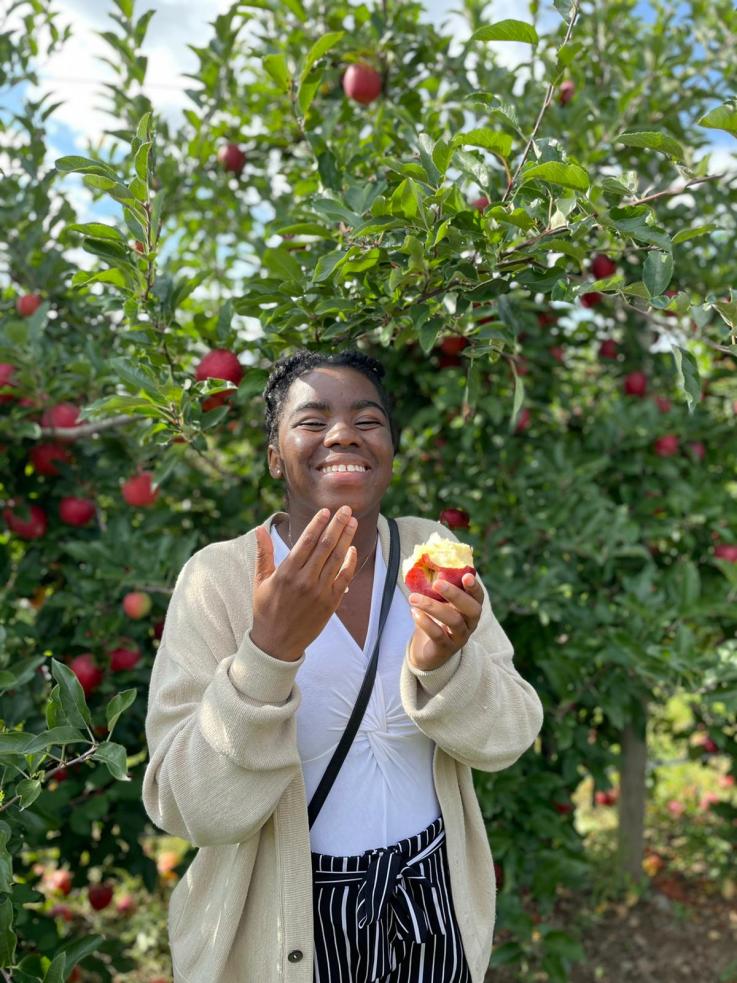Curci Foundation 2 Year Fellowship, and UW Fellow for Academic Excellence
PhD in Pathobiology program
Please tell us a little bit about yourself.
I am an international student from Nigeria and South Africa. My twin brother and I were born to two loving Nigerian parents and a rambunctious older brother in Enugu, Nigeria. So, by birth and by blood, I am proudly Nigerian. However, I've spent over half of my life in South Africa, which I call home. I've also lived in Ethiopia and Zimbabwe before moving to the U.S. for my bachelor's degree. I received my bachelor’s degree in microbiology from the University of Rochester, located in Upstate New York, and that is where I honed my passion for all things microscopic and my entrepreneurial leadership skills. It was also here where I joined Dr. Paige B Lawrence's lab at the University of Rochester Medical School, where I had the opportunity to study the impact of per- and poly-fluoroalkyl substances (PFAS) on the replication of Influenza A. This further enticed me to pursue infectious disease research after my undergraduate degree. My love for biological research, concern for the well-being of humanity, and desire for a global perspective on health topics ultimately led me to apply to the Pathobiology program here at the University of Washington.
Why did you decide to attend the UW for graduate school?
Going into my search for graduate schools, I knew I wanted to be a part of an initiative that encouraged curiosity and was purposeful. Additionally, I enjoy getting involved in my community through volunteering, teaching, and outdoor excursions, so I was looking for a program where I could make time for these activities. In my search, I came across the Pathobiology program at the University of Washington. The emphasis on incorporating multiple disciplines to understand and address the causes of disease significantly stood out to me. The program highlights the balance between clinical and non-clinical research, which appealed greatly to me. Watching the videos by doctoral students who shared their experiences at the university, I realized I would be joining a driven and caring community. Ultimately, what drew me to apply was the global perspective of the program. With over 300 initiatives spread across 147 countries, I knew this was a rare opportunity to combine my knowledge of biology with clinical approaches to create initiatives outside the United States.
What are your research interests?
I desire to carry out scientific investigations that can assist in instigating change through advancing health policy and programs that address current and future crises in disadvantaged populations, like mothers and their infants, especially in developing nations.
What are you enjoying most about your graduate program?
As a graduate student, you get the unique opportunity to peek behind the curtain of “science” and see what it’s like to research in an academic setting. During my search for graduate programs, I noticed that things can get quite ugly amongst scientists when an unhealthy sense of competition is involved. Something I saw and picked up on when I interviewed at UW was that the other students genuinely smiled. There was a relaxed tone when it came to socializing with each other, and I could see the bonds people had made within the program. There was no backstabbing or perpetual talk about whose research was more interesting. The different cultures, ethnicities, and identities also made it easier for my to let my guard down and get to know those around me. I rarely feel safe enough in a crowd of strangers to engage with them. So, when I experienced that feeling, I knew I had to be a part of it. What I enjoy the most about my program is that our differences are welcomed, and collaboration is encouraged. It also helps that most people are fantastic bakers and cooks!
Did your award influence your decision to attend UW?
I am happy to say that I am a 2023 CURCI Foundation Scholar, and receiving this award impacted my decision to join the program. As an international student in the United States, it can be challenging to apply for grant funding as most of the well-known grants are directly tied to citizenship status. My main concern was that I wouldn’t have the same opportunities to receive recognition for my work, which would help to strengthen my resume for post-graduate career building. Additionally, I felt that my options for joining a lab would be more limited compared to my peers who had the potential to apply for external funding. However, once I was informed about the CURCI scholarship, it reassured me that opportunities were available for people like me and that my program would be a great support in my search for career development opportunities. I am grateful to my department and the CURCI Foundation for their generous investment into my career and for creating an opportunity that enables international students and women, people who aren't frequently seen or heard in prominent academic spaces, the chance to pursue our passions.
